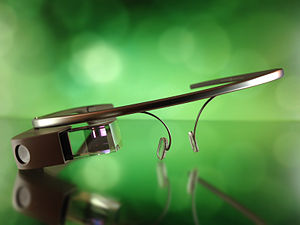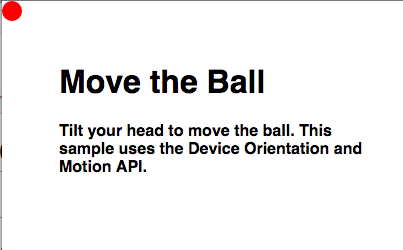Using Google Glass with AppStudio: Difference between revisions
Jump to navigation
Jump to search
(→Sample) |
(→Sample) |
||
| Line 26: | Line 26: | ||
The sample linked to at the top of this article moves a red circle on the screen, based on your head movement. It uses "gravity", which means it moves faster as you increase the tile of your head. The app is a modified version of AppStudio's standard Accelerometer sample, with two modifications: The x and y values had to be multiplied by -1 to properly respond to the accelerometer data, and the z access had to be substituted for the y access (moving your head back and forth affected the z access). | The sample linked to at the top of this article moves a red circle on the screen, based on your head movement. It uses "gravity", which means it moves faster as you increase the tile of your head. The app is a modified version of AppStudio's standard Accelerometer sample, with two modifications: The x and y values had to be multiplied by -1 to properly respond to the accelerometer data, and the z access had to be substituted for the y access (moving your head back and forth affected the z access). | ||
[[File:Googleglasssample.png|framed]] | [[File:Googleglasssample.png|framed|left]] | ||
Revision as of 13:36, 8 November 2014
GoogleGlass Sample
Overview
Google Glass is a wearable technology from Google. Since it runs Android and a browser, we experimented with running apps created with AppStudio on it. It works, but there are a number of observations to keep in mind.

- AppStudio apps run as you would expect - no drama.
- Both JavaScript and BASIC work fine.
- No keyboard means no input controls.
- jQuery Mobile controls work fine, but can be tricky to use.
- No offline apps. Google Glass is designed to be connected full time.
- No home screen, so no way to save to Home Screen.
- To open the sample above, say "OK, Glass. Google NS Basic Google Glass". This page will appear. Put two fingers on the Google Glass touchpad and use your head to move the cursor to the link about. Click to start.
- It's pretty quick. Using our benchmark, it clocked in at 300,000: a bit faster than an iPhone 4.
- Screen size is 427x240.
- You can use a larger screen size by scrolling (move your head with two fingers on touchpad) and zooming (move your two fingers back and forth on the touchpad).
- Communications are by normal WiFi, or Bluetooth to your phone.
- The phone is used for some of the heavy lifting, like GPS.
- It interfaces with iOS and Android devices, but there are more features on Android
- Updates to the Google Glass OS come monthly.
- Google says this is an experimental technology. The hardware is quite nicely done: it will be interested to see how the software evolves.
Sample
The sample linked to at the top of this article moves a red circle on the screen, based on your head movement. It uses "gravity", which means it moves faster as you increase the tile of your head. The app is a modified version of AppStudio's standard Accelerometer sample, with two modifications: The x and y values had to be multiplied by -1 to properly respond to the accelerometer data, and the z access had to be substituted for the y access (moving your head back and forth affected the z access).
